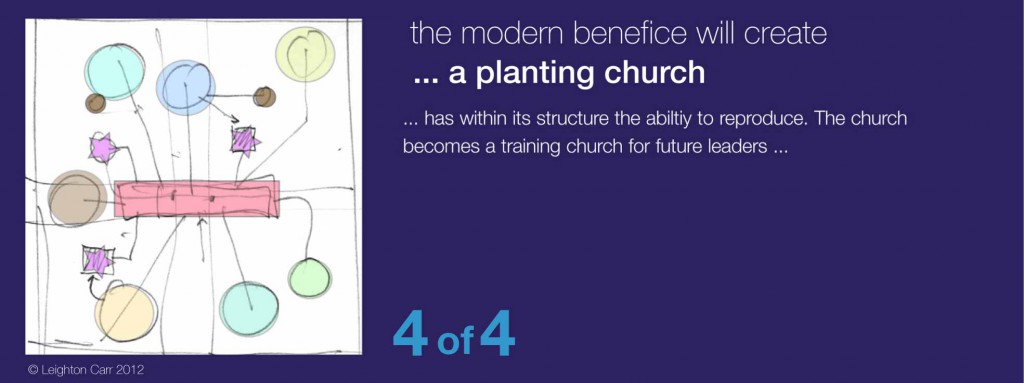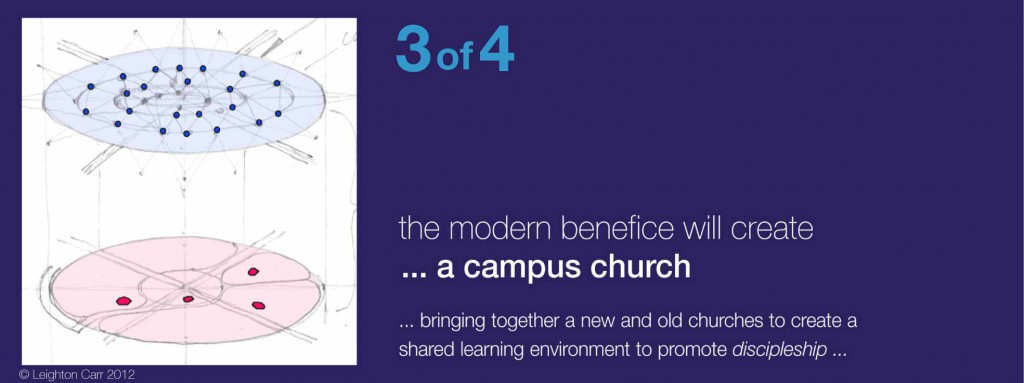We’ve put out a call for help from local churches to shape Anglican church life in Battersea and Nine Elms over the next twenty years … (For a zoomable image click here…)\r\n\r\n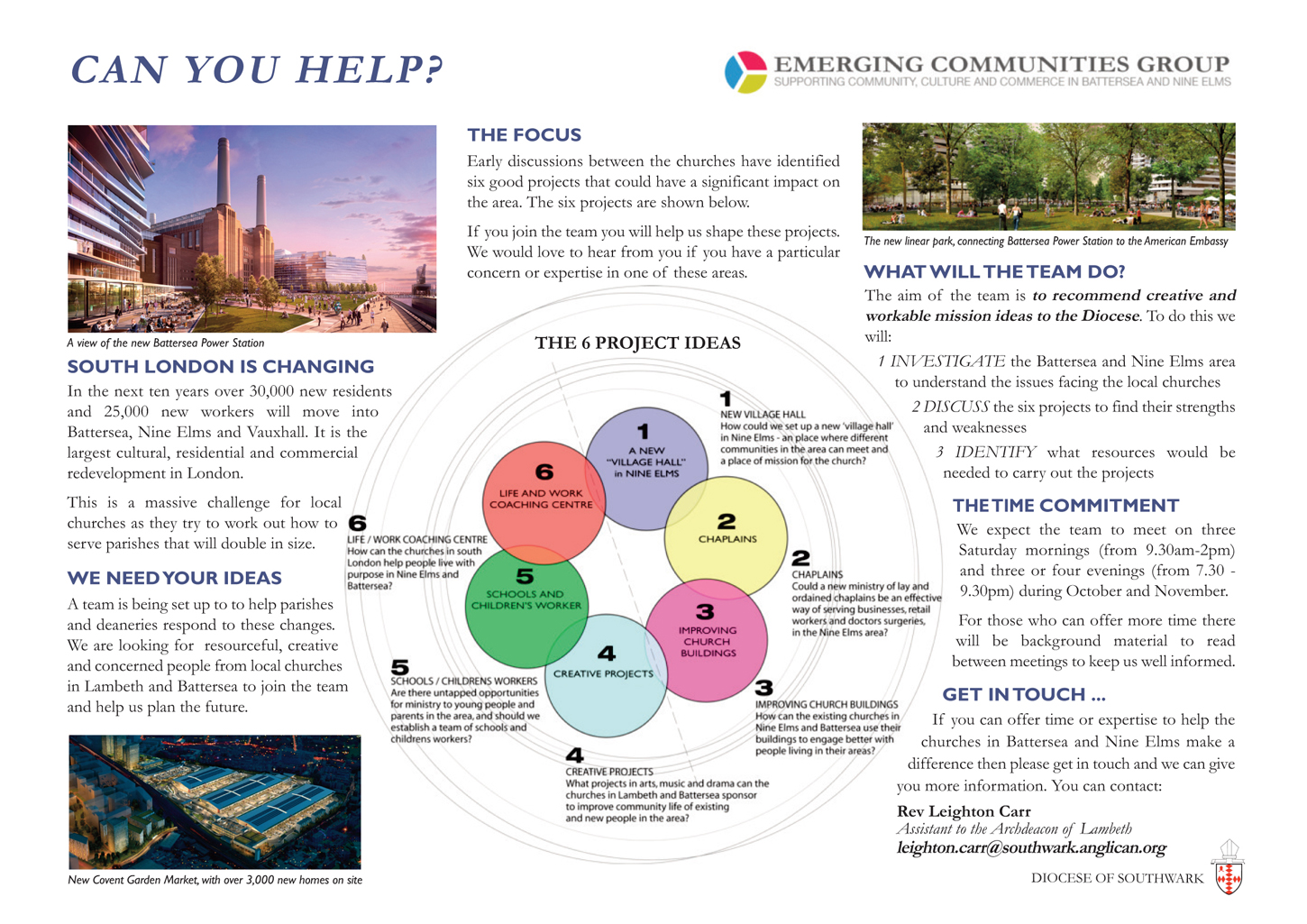
Category: sustainability
Common Sense – the missing ingredient in leadership?
An interview with Theo Paphitis in The Market magazine is instructive:\r\n\r\n‘His consistent ability to read a business, identify key issues, and then take successful action surely must rely on a methodology or set of processes?\r\n\r\n”No, not at all,” he rebuffs. “I’m not a financial engineer … I’m a people person. I never go into a company saying “I’m going to turn this around”.\r\n\r\n”Instead I listen to the people who know the business best – the staff. Not the board or the senior management, but the people on the shop floor, at the sharp end. Normally they know all the reasons why a business is struggling. My talent is listening to people around me and then implementing the right changes in detail. At’s about the application of common sense.\r\n\r\n”I see everyday in my business life, that common sense isn’t very common.”\r\n\r\nIt makes sense …. the flip side of Front Line Staff\r\n\r\n
Seasonal Fruit
1st October.\r\n\r\nNew month. New cycle of psalms.\r\n\r\nThe Coverdale translation of the Psalms in the Book of Common Prayer is tolerable (just about, to my modern mind) because of the benefits of pattern, structure and rhythm the daily division of the Psalter offers to my life.\r\n\r\nEvery day, for thirty days, morning and evening, the Psalms packaged up to be read in a month.\r\n\r\nOn a month with 31 days I read the Ordinal – the ordination service – on the 31st, which follows straight after the Psalms. It’s good to remind myself what God, my Bishop and the church requires of me.\r\n\r\nBut today, the 1st October, as I turned back to Psalm 1, I paused at the Commination, a little known and hardly used public liturgy describing sins and judgements found in the Bible. It’s been a while since I read it and so this morning I spent a few minutes going through it, I have to say reasonably quickly because it’s not the most enjoyable text in the book.\r\n\r\nAfter the initial introduction and responses, the Commination doesn’t hold back on painting a pretty bleak picture of God’s judgement. There are no paragraphs, just one great block of unrelenting text. And about a fifth of the way through it says this:\r\n
‘For now is the axe put to the root of the trees,\r\n so that every tree that bringeth not forth good fruit\r\n is hewn down, and cast into the fire.’
\r\n
That goes to the heart of the fear and guilt many Evangelicals face when they reflect on their life.
\r\n
Fruitlessness.
\r\n
How many times have I sat under a sermon where the preacher has expected action on my part – where action equals fruit – from ‘winning the lost’ to serving the poor. And yet most days are just – ordinary days. Up, eat, work, home, eat, TV, bed. Sometimes a home group or PCC meeting (do they count?).
\r\n
The good pastor doesn’t leave the congregation without hope, but turns the page from the Commination to Psalm 1 to paint the whole picture.
\r\n
‘Blessed is the man that hath not walked in the way of sinners …\r\n But his delight is in the law of the Lord…\r\n And he shall be like a tree planted by the waterside:\r\n that will bring forth his fruit in due season.\r\n His leaf shall not wither:\r\n and look, whatsoever he doeth, it shall prosper.’
\r\n
Of course, we remember, fruit is seasonal.
\r\n
Nowhere in the garden do we have continual fruit. For two years our blackcurrent bush was fruitless while it bedded in but our apple tree – in it’s season – was prolific. The strawberries weren’t as fruitful as we had hoped, but in due course some fruit appeared. The chillies were great, the tomatoes were small. And so on.
\r\n
That’s not to say that we aren’t surprised sometimes by unseasonal fruit, or that there aren’t other times which we expect to be fruitful that turn out not to be, at least as far as we can see with our limited perspective.
\r\n
But we should be encouraged. This psalm reminds us that while waiting for seasonal fruit the tree can be still be thriving. It’s a picture of flourishing, not a picture of a long winter between seasons of fruit.
\r\n
And the secret to thriving? Be planted in the right place.
\r\n
We may not be able to force out the fruit, but we can take control of our garden.
\r\n
And for more on fruit see Seeds in my Pocket
The Mindfulness of Meditation
What do the Singapore Government, the IMF, Bridgewater (the world’s biggest hedge fund), and Pimco (global investment advisers) have in common?
\n
They all have senior executives who meditate every day.
\n
In an article in the FT this week a number of senior executives described how they are committed to meditation.
\n
Mr Peter Ng, the Chief Investment Officer of the Government of Singapore, meditates for twenty minutes two times a day. Mr Ng is in charge of tens of billions of dollars of investments. He says,
\n
“quieting the mind can help managers conserve energy in daily work life …. and bring greater clarity … and greater clarity makes you more orderly”.
\n
Sean Hagen of the IMF says that mediation …
\n
“… helps you focus, which is a good skill, and encourages a ‘one-thing-at-a-time’ approach, which helps slow things down”
\n
The other benefits listed are achieving equanimity, gaining perspective, increasing decision making skills, and removing ‘confirmation bias’ – the tendency to seek out information that supports your own point of view to the exclusion of data that might be right but contradictory.
\n
I read this article on Thursday morning and later that day I met up with a fellow leader who showed me cuttings from four different broadsheet newspapers this week on the same subject – meditation in business.
\n
It seems that meditation is having a good week.
\n
Which led me to puzzle over two things.
\n
First, none of these executives linked meditation to religion. They practised ‘secular’ meditation for its intrinsic benefits. So how does that compare to the practise of meditation by people leading the church, where meditation has a rich tradition in spiritual formation?
\n
I wondered how many church leaders (and that’s not just ordained or licensed people) have the same discipline of regular meditation as these successful businessmen.
\n
It’s worth some research to find out.
\n
Somehow I suspect that the findings would be disappointing, certainly if the gauge of successful meditation includes equanimity, perspective, increased decision making skills, and (especially) removing confirmation bias (look at most church mission strategies).
\n
The second puzzle was this. None of these executives related meditation to religion, and yet the Christian tradition has 2,000 years of expertise in developing high quality, life enhancing, personal meditation skills. How did we loose the high ground on this?
\n
Answering this question runs the risk becoming being an academic exercise, so perhaps time would be better spent reflecting on the more important question of how Christian meditation leading to spiritual formation could open new avenues of engagement with people around us.
\n
After all, meditation in the Christian tradition is not restricted to the elite – either of the world’s financiers or even the church. Rather, Jesus’ guidance given in the Sermon on the Mount, as recorded by an office worker, was for everyone to ‘Find a secluded place …. and be there as simply and honestly as you can manage’*.
\n
\n
*Matthew chapter 6 verse 6: [The Message version]
\n
G.L.A.D. – A church near you?
At a conference I attended recently one of the speakers – going ‘off piste’ from his subject of The Environment – started musing openly about various facets of church life, increasing in confusion until he finished with ‘…but what is church anyway?’.
\n
“For goodness sake, is it really that complicated?” I thought, as I do so often nowadays when people pontificate in confusion on this subject.
\n
Anyway, I have my own mnemonic for the simple definition of an effective church, which is G.L.A.D. – being
\n
\n
G – gathered in worship, praise and prayer
\n
L – learning together from experience and scripture
\n
A – active in witness and service inside and outside the church
\n
D – distinctive as a community – living well in difficult times.
\n
\n
So, how do you become an effective church leader?
\n
Keep it simple and focus on these few key essentials of an effective church.
\n
(… closely related to ‘The Big Four of Discipleship’)
\n
The successful modern Church of England benefice 4 – Planting
The successful modern Church of England benefice is an organic, networked and campus church, created for growth and witness. It is the logical outworking of this new Anglican focus that the successful benefice will find opportunities to share its resources and experience and expertise with other churches and in other places. It will become a Planting church. At times this will mean offering help to Anglican and other churches experiencing difficulties, and at other times it will mean starting new ventures of different shapes and styles to meet particular needs and opportunities.\r\n\r\nThis is 4 of 4: to see the whole poster go here\r\n\r\nOr see each individual post here: 1-Organic 2-Networked 3-Campus\r\n\r\n
The successful modern Church of England benefice 3 – Campus
The successful modern benefice in the Church of England will need to become a Campus. This means it will draw together resources for teaching, mentoring, coaching and training, for the purpose of helping Christians deepen their discipleship and witness. Lay ministers will need to work in a more flexible way, working in teams, with each person working to their strength, be it research, writing, preaching, coaching. The Campus church will also attract external resources from outside the Anglican church – theologians and educators – as well as offer resources to all local colleges and schools (not only Church of England schools!) to build up the life of society as a whole.\r\n\r\nThis is 3 of 4: see the whole poster go here\r\n\r\nOr see each individual post here: 1-Organic 2-Networked 4-Planting\r\n
The successful modern Church of England benefice 1 – Organic
A successful modern Church of England benefice will need to be Organic. That is, it will need to grow and flex within existing and new areas – geographically, physically, theologically and socially. Rigid strategies won’t cut it. Leaders will have to be creative and articulate, the people they lead will need to be patient and forgiving – and more involved! All will have to be totally committed to making it work if it is to grow. This has not been the Church of England way in recent times, but if it is survive into an uncertain future then traditional Anglican sensibilities will have to be challenged.\r\n\r\nThis is 1 of 4: see the whole poster go here\r\n\r\nOr see each individual post here: 2-Networked 3-Campus 4-Planting\r\n\r\n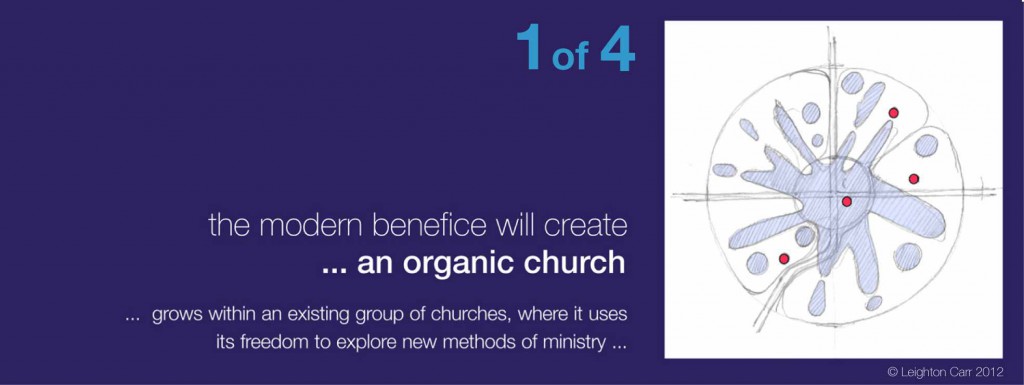 \r\n\r\n
\r\n\r\n
- The Successful Modern Benefice is … Organic
Community Temperature Taker
Last week Pete Scazzero of New Life fellowship Church in New York introduced us to his Community Temperature Taker.\r\n\r\nThis tool for testing the relational health of a community was developed by Pete and Geri Scazzero from a method originally created by family therapist Virginia Satir for use with families.\r\n\r\nIt works simply like this: each person involved takes it in turn to make a statement at each of five levels, starting at the bottom of the thermometer (see picture below) and working up to the top. If it is not possible to move past a particular point that tells something about the temperature of the relationship(s). If every stage is done but with difficulty, that too says something about how good the relationships are. Of course, taking the temperature may also show that all is well.\r\n\r\nFor help on how to use the Community Temperature Taker a good set of notes can be found at:\r\nwww.oakpointe.org/pdf/sermon-notes/EHS/CommunityTemperatureReading.pdf\r\n\r\nThis tool works in one-to-one settings and groups, although Pete did clarify that it may be preferable to omit the third stage in a team group setting.\r\n\r\nI’ve tried it and highly recommend it!However, I’m still trying to remember to do Stages 2 and 3 around the home:\r\n\r\n”I’m puzzled as to why that mess is still there after three days” instead of “for goodness sake, clear it up!”;\r\n\r\nand\r\n\r\n”I notice that you never do the washing up and I prefer sharing the tasks more evenly” rather than muttering under my breath yet within earshot “Why’s it always me doing this – on my own!?”\r\n\r\n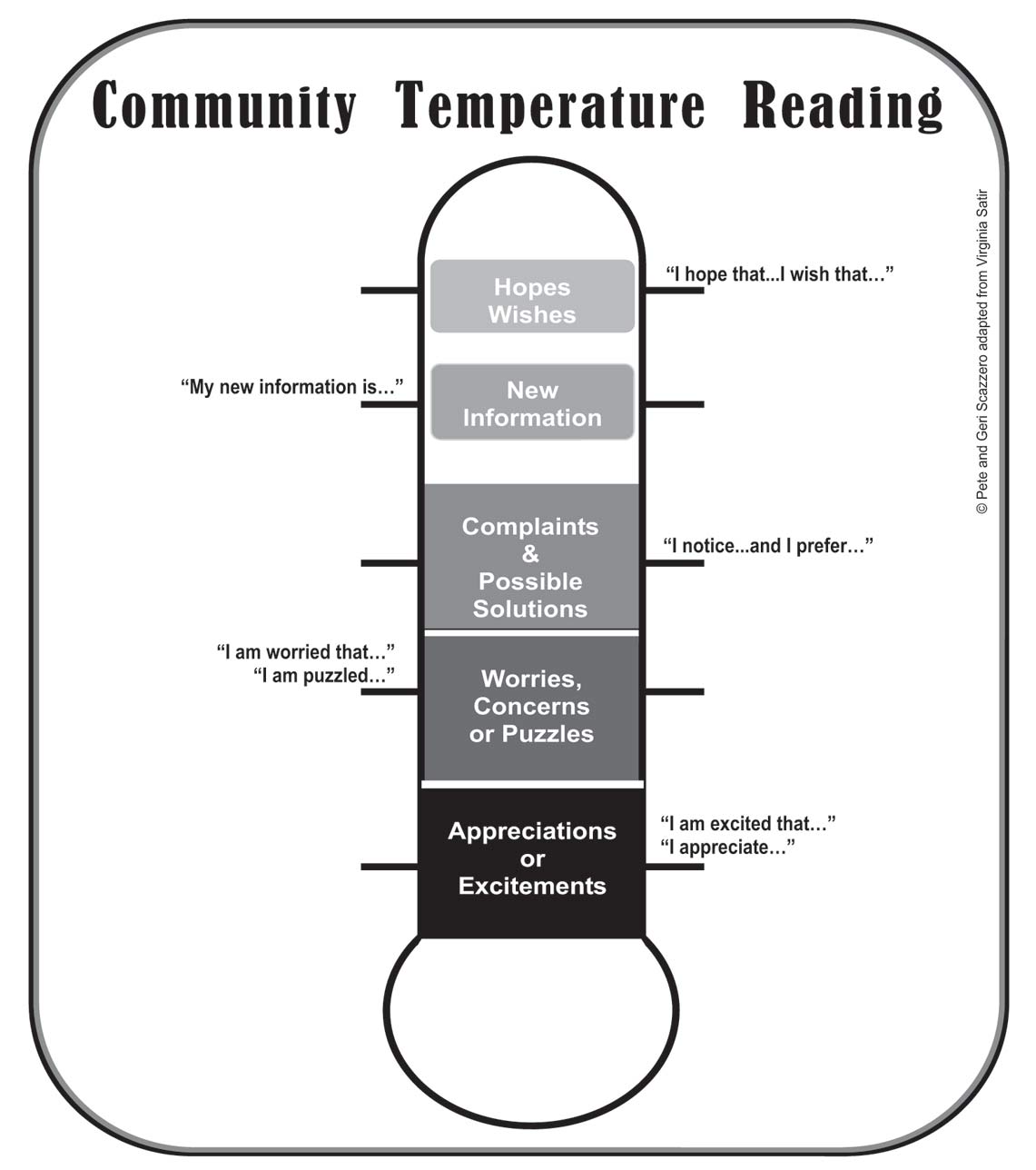
Cliff Edge Volunteers
One encouraging fact to come out of the Olympics was this: people like to volunteer.\r\n\r\n240,000 people applied to be Olympic volunteers around London, of which only 70,000 (ONLY 70,000!) were chosen.\r\n\r\nThe National Trust runs with the help of over 60,000 volunteers.\r\n\r\nAnd yet, most churches are struggling to get hold of volunteers.\r\n\r\nBut then, most churches don’t have anything as exciting as the Olympics to offer (although we have plenty of old buildings we may end up giving to the National Trust). We may bandy about statements about the worthiness of the church, but the reality is that most churches are dull and introverted organisations. We are creating proportionally more bureaucracy to serve fewer people in dwindling congregations. The opportunity to serve as a volunteer in church now seems to be propping up creaking structures that should by all other measures be disbanded.\r\n\r\nAnd that is of little or no interest to most people under forty, let alone those under twenty.\r\n\r\nLeaving aside the lack of opportunities for meaningful engagement in church, selecting the right person for the right job in church is not as easy as choosing thousands of volunteers to stand on street corners and point people around London. New volunteers are all very well in principle, but not every volunteer is appropriate for key roles in the church. And those volunteers who are appropriate are rarely available, being already overcommitted on existing committees.\r\n\r\nNo, what we need is a new focus. And perhaps it should be based on Jesus’ own example. We rarely see Jesus cajoling his disciples to volunteer (feeding 5,000 perhaps). Instead we find him commissioning them way before they were ready to leave the comfort and close proximity to the main group and head off by twos into unknown territory to discover the joys of Cliff Edge service.\r\n\r\nFollowing this pattern, we need to create some new Cliff Edges to walk along outside the church.\r\n\r\nIn Sports Clubs.\r\n\r\nIn Media.\r\n\r\nWith the Poor.\r\n\r\nWith the Rich.\r\n\r\nIn the Arts.\r\n\r\nIn Government.\r\n\r\nWith Business.\r\n\r\nWith Money.\r\n\r\nIn Britain.\r\n\r\nIn the world.\r\n\r\nWith Secularists.\r\n\r\nWith faithful others.\r\n\r\nYou name it. No really … you name it!\r\n\r\nLet’s make the business of volunteering for the church deeply meaningful and inherently stretching.\r\n\r\nAnd how?\r\n\r\nLet’s find out what our volunteers can do, what interests them, what gifts God has endowed them with, and what Cliff Edge only they can walk along.\r\n\r\nThen let’s support them – rather than ask them to support us.
